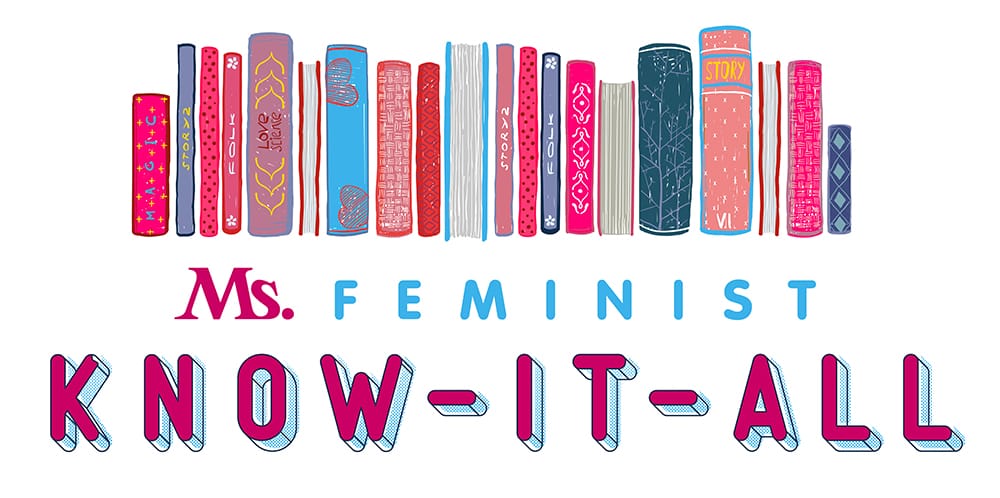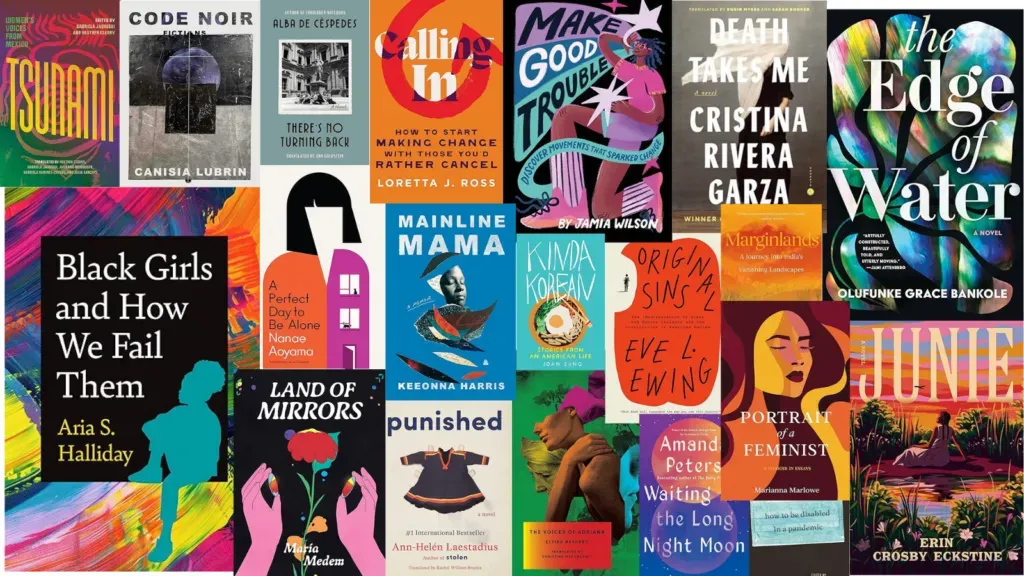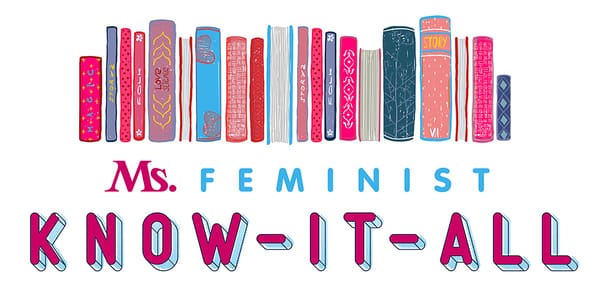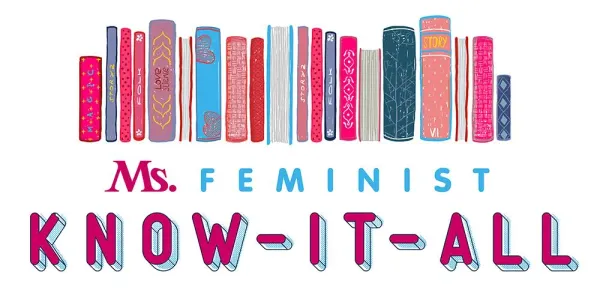February Reads for the Rest of Us

Note: This article was originally published by Ms. Magazine on Feb. 18, 2025.
Hello, feminist reader friends! Each month, I provide Ms. readers with a list of new books being published by writers from historically excluded groups. The aims of these lists are threefold:
- I want to do my part in the disruption of what has been the acceptable “norm” in the book world for far too long—white, cis, heterosexual, male;
- I want to amplify indie publishers and amazing works by writers who are women, Black, Indigenous, Latinx, APIA/AAPI, international, queer, trans, nonbinary, disabled, fat, immigrant, Muslim, neurodivergent, sex-positive or of other historically marginalized identities—you know, the rest of us; and
- I want to challenge and encourage you all to buy, borrow and read them!
Welcome to the winter of our discontent.
Just me? I don’t think so.
I’m sorry we are in this mess (you know the one I mean…), but I am pleased that we’re all in it together. And together, we will persist, resist and get through this.
I take comfort, inspiration and ideas from books. From the 20 below, I’ve learned about Sámi boarding schools, Mexican feminisms and new strategies for having courageous conversations. I’m even more convinced of the urgent need for educational and political reform. I’ve read stories of exclusion and violence, as well as hope and triumph. I’ve seen truth decimate fear, light scare away the dark, comfort prevail over capitalistic greed.
That’s what books do: They comfort us, educate us, enrage us and inspire us. Whatever books you read this month, I hope you find what you’re looking for.

Calling In: How to Start Making Change with Those You’d Rather Cancel
By Loretta J. Ross. Simon & Schuster. Out now.
In this essential volume, Loretta J. Ross has committed her invaluable work on “calling in” to paper. Through poignant and personal storytelling, Ross candidly calls us all in, and you’ll want to answer. (Read Carrie Baker’s full review, or our favorite quotes from the book.)
*
Code Noir: Fictions
By Canisia Lubrin. Soft Skull. Out now.
Canisia Lubrin’s spectacular debut is based on the Code Noir of 1685, a set of 59 decrees that defined French colonial slavery. Incorporating various forms, styles and tones, Lubrin’s 59 fictions make for a captivating one-of-a-kind volume.
*
The Edge of Water
By Olufunke Grace Bankole. Tin House Books. Out now.
This compelling debut is focused on the lives of a Nigerian mother and daughter whose complex relationship is further complicated by tradition, Yoruba Christianity, migration and more. Spanning time and place, this is a powerful story.
*
Junie: A Novel
By Erin Crosby Eckstine. Ballantine Books. Out now.
On the precipice of the Civil War, a young girl enslaved on an Alabama plantation awakens her sister’s ghost when confronted with secrets, changes and choices in this layered and lyrical debut.
*
Land of Mirrors
Written by Maria Medem. Translated by Aleshia Jensen and Daniela Ortiz. Drawn & Quarterly. Out now.
In this kaleidoscopic graphic novel, a woman in a deserted town finds her purpose in a flower until she meets someone who shows her there may be life and hope beyond her current surroundings. It’s stunning in message and in presentation.
*
Mainline Mama: A Memoir
By Keeonna Harris. Amistad. Out now.
As a young mother with an incarcerated partner, Keeonna Harris knows firsthand how challenging life as a “mainline mama” can be. In her outstanding debut memoir, she shares her experiences, wisdom and lessons for an abolitionist future.
*
Marginlands: A Journey into India’s Vanishing Landscapes
By Arati Kumar-Rao. Milkweed Editions. Out now.
I love reading about nature and people’s relationship to the land. In a volume illustrated with her own photos and drawings, Arati Kumar-Rao shares her journeys through India and the invaluable lessons she’s learned.
*
Original Sins: The (Mis)education of Black and Native Children and the Construction of American Racism
By Eve L. Ewing. One World. Out now.
With Original Sins, the brilliant scholar-organizer Eve L. Ewing presents us with a critical re-framing of the systems designed to educate our kids and challenges us to envision a new, more equitable path for all.
*
A Perfect Day to Be Alone: A Novel
Written by Nanae Aoyama. Translated by Jesse Kirkwood. Other Press. Out now.
Winner of the prestigious Akutagawa Prize in Japan, this graceful English-language debut explores loneliness, satisfaction and independence during a year in the life of a young woman who moves in with an elder relative.
*
Punished: A Novel
Written by Ann-Helén Laestadius (Sámi and Tornedalian). Translated by Rachel Willson-Broyles. Scribner. Out now.
Centering on five Indigenous children stolen from their homes to attend a government-run boarding school in 1950s Sweden, this powerful and enlightening historical novel is based on Ann-Helén Laestadius’ own family’s story.
*
There’s No Turning Back: A Novel
Written by Alba De Céspedes. Translated by Ann Goldstein. Washington Square Press. Out now.
Originally published in 1938, this incredible debut was banned by the Italian fascist regime for its portrayal of eight women sharing a convent boarding house in Rome. Radical and revolutionary, this is the rediscovered feminist classic we need now.
*
Tsunami: Women’s Voices from Mexico
Translated by Heather Cleary, Gabriela Jauregui, Julianna Neuhouser, Gabriela Ramirez-Sanchez and Julia Sanches. The Feminist Press at CUNY. Out now.
From historical essays and theoretical reflections to poetry and experimental pieces, the works included here illustrate the depth and breadth of the feminisms, knowledges, concerns and queries of Mexican and Latin American women.
*
Waiting for the Long Night Moon: Stories
By Amanda Peters (Mi’kmaq). Catapult. Out now.
Amanda Peters has written this searing and insightful collection of stories highlighting Indigenous lives and experiences. If you enjoyed Peters’ The Berry Pickers, don’t miss this one.
*
Black Girls and How We Fail Them
By Aria S. Halliday. University of North Carolina Press. Out now.
In this urgent volume, Dr. Aria S. Halliday examines how hatred and mistreatment of Black girls have actually risen with the increase in their representation and how we can counteract this trajectory.
*
The Voices of Adriana
Written by Elvira Navarro. Translated by Christina MacSweeney. Two Lines Press. Out now.
Death, online dating, ghosts and voices … this metafiction is innovative, surreal and dark, with a lot to say about grief, care, memory and love.
*
Death Takes Me: A Novel
Written by Cristina Rivera Garza. Translated by Robin Myers and Sarah Booker. Hogarth. Out Feb. 25.
The latest from Pulitzer Prize-winning writer Cristina Rivera Garcia challenges what we think we know about gendered violence in this latest literary crime drama. You won’t want to miss it.
*
How to Be Disabled in a Pandemic
Edited by Mara Mills, Harris Kornstein, Faye Ginsburg and Rayna Rapp. NYU Press. Out Feb. 25.
This imperative volume chronicles the experiences and activism of disabled people in New York City during the COVID-19 pandemic and includes contributions from scholars, writers and organizers.
*
Kinda Korean: Stories from an American Life
By Joan Sung. She Writes Press. Out Feb. 25.
Joan Sung’s candid and courageous coming-of-age memoir speaks to racism, intergenerational trauma and living between cultures and spaces as a first-generation Korean American woman.
*
Make Good Trouble: Discover Movements That Sparked Change
By Jamia Wilson. DK Children. Our Feb. 25.
Featuring over 70 stories of bravery, audacity and necessary trouble, this radiantly illustrated and informative volume highlights people and movements like the Little Rock Nine, Indigenous Water Protectors, sex ed, disability justice and more.
*
Portrait of a Feminist: A Memoir in Essays
By Marianna Marlowe. She Writes Press. 288 pages. Out Feb. 25.
In her standout debut memoir, Peruvian American writer Marianna Marlowe explores the intricacies and meaning of feminism, building on her own life, experiences and evolution.
*
Also out this month:
All the Parts We Exile
By Roza Nozari. Knopf.
Becoming Spectacular: The Rhythm of Resilience from the First African American Rockette
By Jennifer Jones. Amistad.
Black Elegies: Meditations on the Art of Mourning
By Kimberly Juanita Brown. MIT Press.
But Not Too BoldBy Hache Pueyo. Tordotcom.
Casualties of Truth
By Lauren Francis-Sharma. Atlantic Monthly Press.
Cleavage: Men, Women, and the Space Between Us
By Jennifer Finney Boylan. Celadon Books.
Enemy Feminisms: TERFs, Policewomen, and Girlbosses Against Liberation
By Sophie Lewis. Haymarket Books.
Fearless and Free: A Memoir
Written by Josephine Baker. Translated by Anam Zafar and Sophie Lewis. Tiny Reparations.
Fundamentally: A Novel
By Nussaibah Younis. Tiny Reparations.
The Girl You Know
By Elle Gonzalez Rose. Bloomsbury YA.
Good Sex: Stories, Science, and Strategies for Sexual Liberation
By Candice Nicole Hargons. Row House Publishing.
Harlem Rhapsody
By Victoria Christopher Murray. Berkley.
A House for Miss Pauline: A Novel
By Diana McCaulay. Algonquin Books.
Humans: A Monstrous History
By Surekha Davies. University of California Press.
I Lived to Tell the Story: A Memoir of Love, Legacy, and Resilience
By Tamika D. Mallory. Atria/Black Privilege Publishing.
Landscaping Patagonia: Spatial History and Nation-Making in Chile and Argentina
By María de los Ángeles Picone. University of North Carolina Press.
Let Us March On
By Shara Moon. William Morrow.
People of Means: A Novel
By Nancy Johnson. William Morrow.
Queer Lasting: Ecologies of Care for a Dying World
By Sarah Ensor. NYU Press.
A Season of Light
By Julie Iromuanya. Algonquin.
Solidarity Betrayed: How Unions Enable Sexual Harassment – And How They Can Do Better
By Ana Avendaño. Pluto Press.
Theory & Practice: A Novel
By Michelle de Kretser. Catapult.
Trans Technologies
By Oliver L. Haimson. MIT Press.
TreeNotes: A Year in the Company of Trees
By Nalini Nadkarni. National Geographic.
Ugliness
Written by Moshtari Hilal. Translated by Elisabeth Lauffer. New Vessel Press.
Who I Always Was: A Memoir
By Theresa Okokon. Atria.




